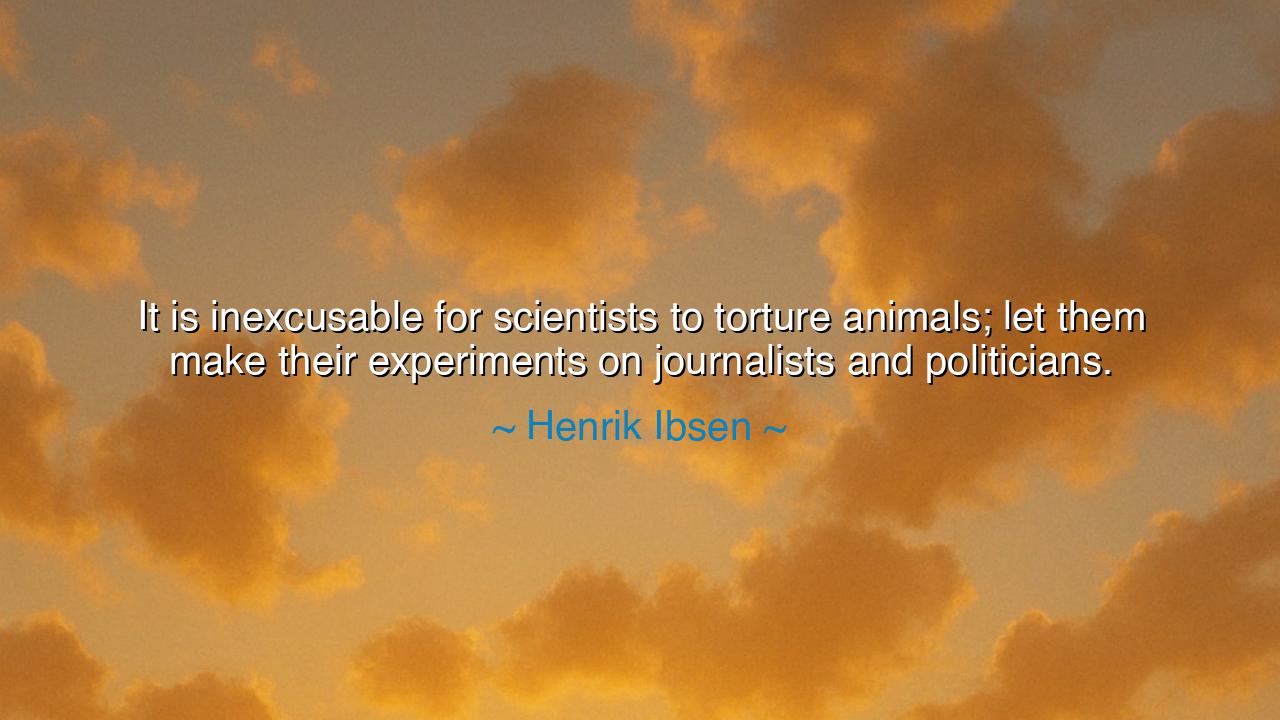
It is inexcusable for scientists to torture animals; let them
It is inexcusable for scientists to torture animals; let them make their experiments on journalists and politicians.






Henrik Ibsen, the fiery voice of conscience and drama, once declared: “It is inexcusable for scientists to torture animals; let them make their experiments on journalists and politicians.” These words, sharp as a blade and heavy as a stone, are not merely jest, but thunder. They cry against cruelty disguised as progress, against the cold reasoning that sacrifices the innocent for the ambitions of men. To call it inexcusable is to denounce not science itself, but the heartless misuse of it—the kind that forgets compassion, that forgets the sacredness of life.
In this saying lies both satire and truth. For animals, voiceless and defenseless, have long been subjected to suffering in the name of knowledge. They cannot protest, they cannot refuse, they cannot speak their pain. Ibsen hurls his challenge: if men of power—journalists with their pens and politicians with their decrees—so readily decide the fate of others, let them, not the beasts of the earth, be the subjects of harsh trials. His words are a mirror, held up to reveal the hypocrisy of a society that preaches civilization while practicing cruelty.
The ancients knew well the measure of justice. Pythagoras himself, philosopher and mystic, warned against the killing of animals, saying that all creatures share in the great chain of life, that the soul of one may be reborn in another. To harm the innocent was, to him, to dishonor the divine order. And centuries later, Leonardo da Vinci, painter and visionary, refused to eat the flesh of animals, lamenting the suffering of beasts as he marveled at the grandeur of creation. Ibsen’s words echo these older voices, crying out that the measure of a civilization is not its inventions, but its mercy.
Consider the story of the nineteenth century, when vivisection—the cutting open of live animals for study—was widely practiced. Dogs, cats, and rabbits were bound and dissected in universities across Europe, their cries dismissed as unworthy of consideration. But from this sea of cruelty rose a tide of protest. Men and women, moved by compassion, demanded laws to protect creatures from needless torment. Societies for the prevention of cruelty to animals were born, and though the struggle continues to this day, it was voices like Ibsen’s that kept the flame alive. His biting words were a call to conscience: if we must suffer for knowledge, let it be the guilty, not the innocent, who bear the burden.
Yet the quote does more than condemn cruelty—it also ridicules the corruption of power. For who better than politicians and journalists, who so often deal in manipulation, to endure the consequences of experiments meant for the public good? In this way, Ibsen strikes at arrogance: let those who presume to lead and influence prove their worth not by speeches, but by sacrifice. His words are satire, yes, but also a summons to justice, exposing the imbalance where the powerless bear the suffering while the powerful escape untouched.
What, then, shall we learn from Ibsen? That compassion must be the root of all true progress. Knowledge without mercy is tyranny, and discovery purchased at the cost of innocent suffering is a curse, not a blessing. The advancement of science must never trample the dignity of life. Instead, let us seek methods that honor creation, that find wisdom without cruelty, that elevate both man and beast. For science is noble only when it is guided by conscience.
So, children of the future, take this counsel to heart: do not excuse cruelty in the name of progress. Question the cost of every discovery, and demand that the weak be protected, not sacrificed. Practice mercy in your daily life—care for the animals that share your world, speak against injustice, and refuse to blind your heart for the sake of convenience. For if compassion dies, all knowledge becomes vain. And remember always: it is not the helpless who should suffer for the ambitions of mankind, but the powerful who must bear the weight of their own decrees. Guard life with mercy, and you guard the soul of humanity itself.






AAdministratorAdministrator
Welcome, honored guests. Please leave a comment, we will respond soon